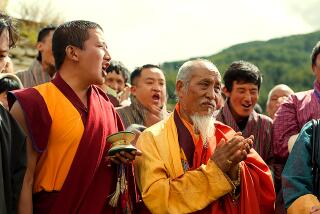Sitting under the Bodhi tree with ‘Buddha’
- Share via
You may think you know the Buddha, because you have seen him standing outside a Chinese restaurant, belly burnished from being rubbed repeatedly for good luck, or hiding in the corner of a garden. But you have more to learn, grasshopper.
David Grubin’s “The Buddha,” which airs Wednesday on PBS, is not the story of Buddhism -- whose history as a religion, like that of Christianity, really gets going after the demise of its founder and is addressed here only in a couple of lines near the end of the film -- but rather that of the historical person who said the things on which followers have based their several, differing practices.
Like the Christian story, it combines meaningful ordinary speech and marvelous supernatural events, although in the case of the Buddha (Siddhartha Gautama to his friends) the miracles express his marvelousness but do not explain or validate it. The Buddha -- and that’s “the” Buddha, as opposed to “a” Buddha, who might be anyone or everyone -- is not God, or even a god, nor is he God’s representative, but just a guy who asked himself some hard questions about 2,500 years ago and, after six years in self-imposed extremity, woke up to the world. That is the meaning of the word Buddha: “awakened one.” It is a bottom-up philosophy, rather than a God-down religion, and its aim, to broadly put it, is to help you to quiet a mind “as restless as a monkey,” to get out of your head to the place where all things are one and compassion determines action.
Siddhartha was an Indian prince, who lived the first 29 years of his life having a good time, shut up in the palace, shielded by his father from anything that smacked of decay. But one day he took a trip outside, and shocked by what he saw, set off into the world to discover how to unbind himself from suffering. (I am giving you the short version.) He threw himself into this work with ferocious intensity; his asceticism had led him to the very brink of starvation, when he was visited by a memory of youthful joy and decided to accept a bit of food from a passing girl. Feeling better, he sat down under a big tree, resolving not to move until he’d achieved enlightenment. The rest is Nirvana.
Narrated by celebrity Buddhist Richard Gere and including commentary from the Dalai Lama, poet W.S. Merwin and scholar Robert Thurman (Uma’s dad), “The Buddha” is a cheerful film, gently paced, pleasant to watch and pretty to look at, its frames filled with ancient art (it was produced in conjunction with New York’s Asia Society Museum), lovely North Indian landscapes, and animated sequences to represent ancient history and miraculous folk tales: Buddha commanding firewood to split; calming a runaway elephant with the radiance of his equanimity; shooting water and flame from his body to the ends of the universe, and filling the sky with the replicas of himself.
Having been small in the last light of a fading hippie culture, I was of course interested, touristically, in the Wisdom of the East. But even for a spiritually lazy person like myself, who wouldn’t be caught dead in saffron robes or sitting for hours in the same place without a book to read, there is a kind of psychic relief to be found just grazing in the pasture. It is not so bad being just a drop in the ocean, when that makes you the ocean, too.
Existence, says poet and Buddhist Merwin, happily gesturing around him, is “just this.” The point is to “pay attention.” And I can do that, sometimes.
More to Read
Sign up for The Wild
We’ll help you find the best places to hike, bike and run, as well as the perfect silent spots for meditation and yoga.
You may occasionally receive promotional content from the Los Angeles Times.







